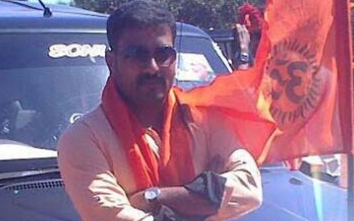Mangaluru, May 28: An army-man-turned Bajrang Dal leader has been arrested along with his four associates by the police on the charges of extortion and blackmail in Moodbidri on the outskirts of the city.
 Santosh Poojary, a local Bajrang Dal leader, caught red-handed when he was blackmailing a resident of Puthige in Moodbidri on Saturday.
Santosh Poojary, a local Bajrang Dal leader, caught red-handed when he was blackmailing a resident of Puthige in Moodbidri on Saturday.
After quitting Indian army under the pretext of ill-health, Santosh had returned to his hometown to engage in real estate business. He joined Bajrang Dal and soon became one of its leaders.
According to police, Santosh had been blackmailing one Raghavendra Bhat on some issue and demanding Rs 2 lakh for some days. Mr Bhat, without the blackmailer's knowledge had informed this to police.
On Saturday, Santosh visited Mr Bhat's residence in Puthige to extort Rs 2 lakh. A team of police from Moodbidri, which was already present there, caught him red-handed.
The police also managed to arrest four of his associates from Moodbidri, Bantwal, Addyar and Kapikkad in Mangaluru at Moodbidri bus stand.
Santosh is the second senior Bajrang Dal leader arrested by the police in Moodbidri this week. Last Wednesday, another Bajrang Dal leader, Sumit Raj, was arrested in connection with an alleged murder conspiracy.
Also Read : Cops avert murder and communal riot by arresting Bajrang Dal leader, associates




Comments
They are giving training , gov need to take action
bec are intention is this kill someone and loot them ,
need to give proper treatment to him
Add new comment